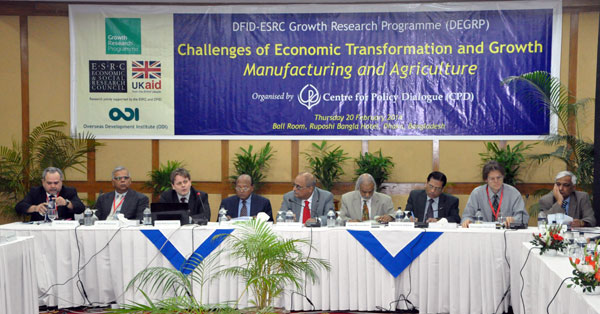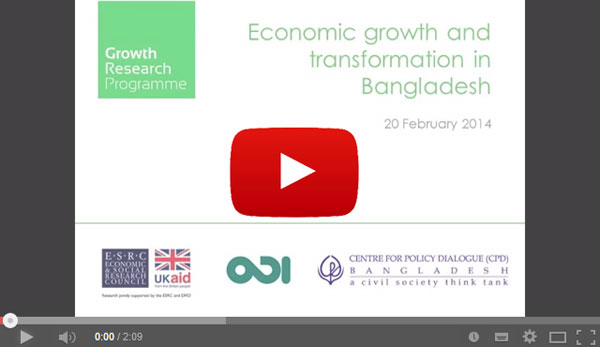Bangladesh’s textile and garment sectors are in need of human resource development, infrastructural upgradation, and significant policy impact in order to take a journey towards raising productivity for structural transformation of the country.
The importance of manufacturing as a ladder for Bangladesh to move upward towards being a middle-income country, discussants further observed at a CPD dialogue titled “Bangladesh’s Garments Sector: Upgradation and Structural Transformation” convened by Centre for Policy Dialogue (CPD) in association with the DFID-ESRC Growth Research Programme (DEGRP) on Thursday, 20 February 2014.

The dialogue held at 9:30 am at Ruposhi Bangla Hotel in Dhaka brought together international experts and national policy makers to discuss how manufacturing (the textile and garments sector in particular) contributes to economic transformation in Bangladesh.
Professor Mustafizur Rahman, Executive Director, CPD delivered the introductory speech at the dialogue chaired by Dr Debapriya Bhattacharya, Distinguished Fellow, CPD.
During the discussion, one of the Panel Presenters Dr Dirk Willem te Velde, Head of Programme, International Economic Development Group, ODI, UK said that projects on agriculture under the DFID–ESRC funded programme tries to understand patterns of economic transformation in Low Income Countries (LICs) with a high potential for impact on policy and practice. He recommended favourable changes in public policy, and incentives for Bangladesh’s RMG industry which has an export value greater than the individual GDP of some 90 countries.
Among the few other issues put on the table, another Panel Presenter Dr Christopher M Woodruff, Professor, Department of Economics, University of Warwick, UK pointed out that the positive impact of mid-level management training has been reflected in areas such as substantial variation in quality of management, decline in defect rate over time. He added that the production process in factories require innovation as goods become more complex.
While presenting case studies on how Pakistan and Mauritius have handled upgradation challenges, Panel Presenters Mr Azam Mohammed, Former Executive Director General and Additional Secretary, Ministry of Commerce, Pakistan and Mr Nikhil Treebhoohun, CEO, Global Finance Mauritius respectively singled out the strengths and weaknesses of their garments and textile industries.
Dr Ludovico Alcorta, Director, Development Policy, Statistics and Research Branch (DPR), United Nations Industrial Development Organization (UNIDO) drew attention to the fact that as GDP per capita rises, industries grow and reach a peak level before they decline. In view of the global growth prospects of textile industries, Bangladesh’s manufacturing industries still have the potential to grow before reaching the aforesaid peak level before shifting to another level of industrialisation.
[box title=”Resources” ]Bangladesh’s Garments Sector: Upgradation and Structural Transformation
Dr Dirk Willem te Velde, DEGRP
Mauritius Structural Transformation: Garment
Mr Nikhil Treebhoohun, Global Finance Mauritius
Bangladesh’s Garments Sector: Up-gradation and Structural Transformation
Mr Azam Mohammed, Ministry of Commerce, Pakistan
Long-term Trends in Textiles and Garments Manufacturing
Dr Ludovico Alcorta, UNIDO
Chief Guest Mr Tofail Ahmed, MP, Hon’ble Minister for Commerce, Government of Bangladesh said that the current government has prioritized investment and industrialisation. In this regard, he called for preparing a comprehensive plan of action in cooperation with policymakers and business leaders.
The event was addressed by Special Guest Dr Abdul Moyeen Khan, Former Minister for Science and ICT for Bangladesh and Designated Respondents Mr Anwar-Ul-Alam Chowdhury Parvez, Former President, Bangladesh Garment Manufacturers and Exporters Association (BGMEA) and Dr Khondaker Golam Moazzem, Additional Research Director, CPD among others.
The event welcomed rigorous open discussion and was widely attended by journalists from print and electronic media.



